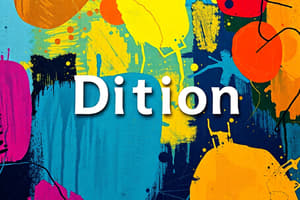Podcast
Questions and Answers
What are the means of persuasion according to Aristotle's rhetorical theory?
What are the means of persuasion according to Aristotle's rhetorical theory?
- Ethos
- Pathos
- Logos
- All of the above (correct)
What does inartistic proof consist of?
What does inartistic proof consist of?
Essentially, facts and evidence.
What is stasis?
What is stasis?
A procedure within rhetorical invention to arrive at a state in which there is no action or progress.
What does logos refer to in rhetorical terms?
What does logos refer to in rhetorical terms?
According to Aristotle, the chief components of a compelling ____ in rhetoric are goodwill, practical wisdom, and virtue.
According to Aristotle, the chief components of a compelling ____ in rhetoric are goodwill, practical wisdom, and virtue.
What does pathos appeal to?
What does pathos appeal to?
Define deduction in the context of reasoning.
Define deduction in the context of reasoning.
What is induction?
What is induction?
What does an argument by signs/probability involve?
What does an argument by signs/probability involve?
What does an argument by definition invite one to consider?
What does an argument by definition invite one to consider?
What is an argument by similarity?
What is an argument by similarity?
What is the focus of an argument by cause/effect?
What is the focus of an argument by cause/effect?
What does testimony involve in rhetorical arguments?
What does testimony involve in rhetorical arguments?
What are material topics in rhetoric?
What are material topics in rhetoric?
Flashcards
Artistic Proof
Artistic Proof
Means of persuasion employing ethos, pathos, and logos, according to Aristotle's rhetorical theory.
Inartistic Proof
Inartistic Proof
Facts and evidence not created by the speaker, such as laws, testimonials, and documents.
Stasis
Stasis
A rhetorical invention procedure using specific questions to reach a conclusion.
Logos
Logos
Signup and view all the flashcards
Ethos
Ethos
Signup and view all the flashcards
Pathos
Pathos
Signup and view all the flashcards
Deduction
Deduction
Signup and view all the flashcards
Induction
Induction
Signup and view all the flashcards
Argument by Signs
Argument by Signs
Signup and view all the flashcards
Argument by Definition
Argument by Definition
Signup and view all the flashcards
Argument by Similarity
Argument by Similarity
Signup and view all the flashcards
Argument by Cause/Effect
Argument by Cause/Effect
Signup and view all the flashcards
Testimony
Testimony
Signup and view all the flashcards
Common Topics
Common Topics
Signup and view all the flashcards
Study Notes
Rhetoric Terms Overview
-
Artistic Proof: Means of persuasion including ethos, pathos, and logos as per Aristotle's rhetorical theory.
-
Inartistic Proof: Facts and evidence not created by the speaker; includes laws, contracts, witness testimonials, and documents such as photographs and surveys.
Rhetorical Concepts
-
Stasis: A rhetorical invention procedure involving the asking of specific questions to reach a conclusion; represents a state with no action or progress.
-
Logos: A persuasive appeal to reason, emphasized by Aristotle. Represents the use of logical reasoning in arguments.
-
Ethos: Persuasive appeal based on the speaker's character; includes components of goodwill, practical wisdom, and virtue.
-
Pathos: Emotional appeal in persuasion, aimed at influencing the audience's feelings.
Reasoning Methods
-
Deduction: A reasoning method where conclusions necessarily follow from given premises.
-
Induction: Forming generalizations based on multiple specific instances.
Argumentation Techniques
-
Argument by Signs: Describes possibilities to encourage or discourage actions based on circumstances.
-
Argument by Definition: Considers the larger group of which something belongs to highlight similarities or differences; e.g., treating littering as a punishable crime against society.
-
Argument by Similarity: Compares and contrasts items; uses analogy to draw conclusions from shared characteristics.
-
Argument by Cause/Effect: Explores the relationships between causes and their effects; used to illustrate implications, such as in Jonathan Swift's "A Modest Proposal".
-
Testimony: Credibility added to arguments by citing other sources or individuals.
Types of Topics in Rhetoric
-
Material Topics: Focus on tangible subjects or phenomena.
-
Formal Topics: Concerned with structural and formal aspects of arguments.
-
Common Topics: General subjects applicable across various situations in argumentation.
-
Special Topics: In-depth issues requiring significant analysis and detailed discussion before decisions are made.
Studying That Suits You
Use AI to generate personalized quizzes and flashcards to suit your learning preferences.



